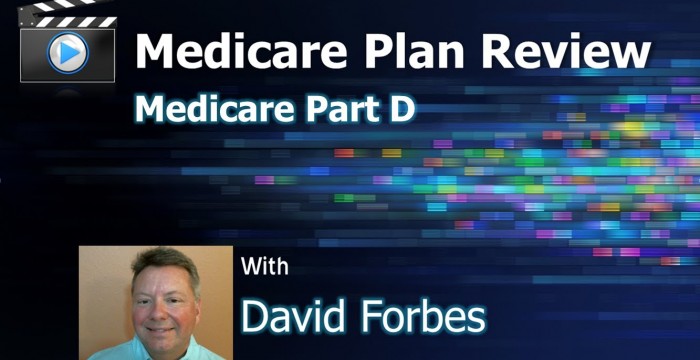Call (888) 310-0376 to Compare all Medicare Part D Plans in Your State. Get Instant Access I explain 5 things you should know about Medicare Part D before you enroll. There have been significant changes to the Part D program since its inception in 2006.
Visit and get access to hundreds of articles on Medicare Part D, Medicare Advantage and Medicare Supplement insurance.
There have been changes to enrollment periods, how premiums are calculated as well as adjustments to the Standard Benefit Model. Some things haven't changed such as who is eligible to join and how plans work.
Here are 5 things you should know about the Medicare Part D program and Part D plans in particular.
One. You need to know what Part D is and how it works. So what is Medicare Part D?
Part D is optional prescription drug coverage for Medicare beneficiaries who are enrolled in both Medicare Parts A and B. Although Part D is optional, you should enroll when you first become eligible or potentially be subject to the Part D penalty which will have an impact on what you pay for as long as you are enrolled in a plan.
Part D is offered by private insurance companies and is not part of original Medicare. Plans are offered by service area and you must live in a service area to be eligible for a plan.
You can get Part D in one of two ways; you can enroll in a stand-alone plan (PDP) or you can enroll in a Medicare Advantage Plan that includes drug coverage. Plans are effective for one calendar year.
Two. Understanding the terminology of Part D is important.
Medicare Part D Premiums — Premiums are paid monthly and have ranged in the low to mid $30 range for the past few years.
Part D Deductible — The deductible is the amount you may be required to pay prior to your plan paying a share of prescription drugs.
Part D copayment / Coinsurance — This is the amount you pay at the pharmacy. Drugs are place in tiers and normally a plan has four or five tiers.
Initial Coverage Limit — This amount is set annually by Medicare and will be the same for all plans. It is the amount both you and your plan will pay prior to you reaching the Part D coverage gap.
Medicare Part D Donut Hole — This is the coverage gap that you may enter if you exceed the initial coverage limit.
Part D Catastrophic Coverage — This phase is reached after you have spent a fixed amount in the Donut Hole, currently $4750. During this phase you will pay very small copayments or coinsurance amounts for your drugs.
Third. You should understand the Medicare Part D enrollment periods. There are 3 types of Part D enrollment periods.
When you first become eligible you have a seven month window to submit an application. If starts three months before the month you turn 65 or if you will receive Part D due to a disability it will start 3 months prior to your 25th month of disability.
The Part D Annual Election Period is the time to compare Part D Plans because you are able to switch, drop or enroll in a plan.
Part D Special Enrollment Periods are time that you can enroll in a plan, normally due to a change in your individual circumstances. Such as, moving from a plan's service area or losing other creditable drug coverage like from an employer or union (including (COBRA). If you live in a nursing home you also are entitled to a Special Enrollment Period.
The 5 Star Special Enrollment Period allows you the opportunity to switch into or enroll in a 5 Star-rated plan once per year. Plans are rated from one to five stars by Medicare and are a reflection of the experience people who have been in enrolled in the plan have had. You are allowed to enroll between December 30th and November 8th.
If you qualify for Medicare extra help you can change plans anytime.
Fourth. You must know how to conduct a thorough comparison of Medicare Part D plans.
You can see all available plans for your service area at the Medicare Plan Finder at medicare.gov. But don't choose a plan based on premium alone. There's a lot more to plan cost than the monthly premium.
Start your search for the best plan by exploring the Medicare Part D formulary for each plan.
The formulary is the list of drugs which are covered by a plan. There is no universal Part D formulary, each plan will be unique. Formularies are either Basic or Enhanced. Making sure all your drugs are covered is your number one goal.
Also compare:
Plan Deductibles
Copayments and Coinsurance amounts
Pharmacy Networks
Part D Mail Order benefits
Fifth. You should be aware that your Part D premium may not be what is published at medicare.gov. Premiums are now tied to your annual income. If you qualify for Medicare extra help, you may pay $0 premiums, but if you earn over $85,000 as an individual or over $170,000 filing jointly, you are going to pay more.







All of this is confusing! I take 1 drug per day. It’s a tier one
medication….very common and cheap. So would it be necessary for me to
enroll in Part D drug plan? My blood pressure is a bit
elevated…..otherwise I’m in good health. I could just pay for my
medication out of pocket instead of paying premiums for part D. (I have
Part A and B) Am I wrong for avoiding part D?
+Teresa Wethington Most people would enroll in Part D to cover the
unexpected. Don’t lose sight of the fact that it’s insurance. What if you
need expensive tier 3 or 4 drugs in the future?
David, my mom is 83, has medicare A and B but never had part D for
medication because was able to afford the medication for blood pressure or
cholesterol. Now she needs chemo treatment for cancer and we need to get
part D. What are her best options? can she still get it?
+Octavio Cordero Unless she qualifies for extra help due to a low income or
is entitled to a Special Enrollment Period she will have to wait until the
next enrollment period (Oct 15 – Dec 7) and will likely pay a penalty for
not enrolling when she was first eligible. That said, most chemotherapy
will be covered by Medicare Part B. She will be responsible for the 20%
unless she has a Medicare supplement.
Very informational. Im training to become a licensed sales agent. This is
my way of studying.
This is a big help as was your book – just what I needed to help me
understand this. Thanks!
Thanks for all the information.There’s so much to take in with all these
plans!!
Good over view of Part D plans and costs, enabling wiser choices.
David, I need Medicare part D but when I first went on SS disability they
told me I had to be 65. Is that true?
Thank You for the information. Greatly appreciated!
Its me again. Wish I’d go away! Aside from reason of fear of future drug
needs and late penalty is there any discussion of how legislators would
appreciate us paying in on part D regardless to keep the system solvent?
+Phillip Hanford Insurance is really ALL based on having everyone pay into
it, whether they currently need it or not. Otherwise, prices would be
exorbitant because only those who are actually using costly services (or,
in this case, taking pricey drugs) would enroll.
Great video; concise and packed with useful info. I just wish you could
increase the recorded volume level during the powerpoint slide portion. I
have my volume cranked all the way up on the computer and the youtube
player and I could barely hear you. Please try to fix it b/c this is great
info you DON’T want viewers to ignore or skip just b/c they can’t hear it.
Keep up the great work
Annual Enrollmnt Period
Part d allows big pharma to ask the price they want from the part d plan
for their drugs but the person carrying part d doesn’t get affected but the
people do, basically the way I understood it was big pharma profits more.
So the tax payers come out of pocket more but the people on part d better
not need their meds a day early just a example I used to pay 2.50 it went
down to about .74 but if something happens or your dr fills it you pay and
it was 167 cash and it used to be 7.00. So I see the profit they are
getting and the drug is one of the most abundant ones made. They sell their
drugs just like street dealers the more popular (or demand) the more they
charge look up bush and the people who profited getting it put in. Big
pharma and you’ll find it. People with disabilities or elderly did cause
the people of America to pay more the fda the gov and other people did to
guarantee political Dana tons I’m guessing. Like when bayer had factor 8
for hemophilia and it was contaminated with hiv they didn’t take it off
shelve here till it was figured out by hemophilia patients then they pulled
it and was told to keep quiet and sent it to Japan Italy and france. Look
up bayer can a minted factor 8 it’s a msnbc report. They other countries
people that allowed this are in prison, but the officials that allowed it
in the stated never even got looked at!!! That’s the greed willing to put
out a drug kill 1000’s of adults and children so they can still make a
400,000,000 dollar profit. I couldn’t hurt 1 human being for no amount of
money. Sorry I’m just disgusted.
Thanks, you answered several of my questions by watching your videos
David-very informative, thank you!
Great job David!
Marie Devine, are you a bot? Visited your profile page and saw that you
have posted this exact comment multiple times. Having a strong opinion
based on your values is admirable, but hiding behind a scripted response
that you post to multiple videos that you have visited is less than honest.
I value a contribution to the conversation… but…
Socialism, Communism and helping poor through federal government insurances
is robbing us of personal relationships and responsibility of a family and
local community sticking together to help each other. We forget how to
love. We have no connection with those helping us or with those being
helped; there is no emotional attachment; there is only anger. Fraud and
abuse are normal. Goal is love. The additional cost of administering
federal helps etc. make it an unwise and inefficient process
You can visit medicare.gov no matter where you live. You can search for all
plans available or submit your list of medications to find the most
relevant part d plans.
Thank you, thank you, thank you!!!!